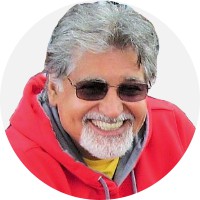The views expressed in our content reflect individual perspectives and do not represent the authoritative views of the Baha'i Faith.
The sad death of my 33-year-old sweet and gentle nephew, my sister’s only son, who had just married and was very dear to me, challenged me to grasp the meaning of his death at such a young age.
His premature passing forced me to think not only about the reality of death, but also about the concept of weighing the value of our lives with the manmade measuring tools of days and years.
We tend to consider it sad when some souls leave this physical world earlier than others. But shouldn’t we focus, I wondered, on thinking about how they used their time while they were alive – instead of just counting the small number of years they spent dwelling in this physical existence?
RELATED: My Brother’s Short Life: Pain into Purpose
Humanity invented the concept of time, based on the Earth’s rotation. We called it a day, and when the Earth made one revolution around the sun, we called it a year. Then we used those rotations to measure our lifespans. Time then became a tangible tool to count the spans of our lives here on Earth. It serves its purpose well. But inherent in this emphasis on our lifespan is the assumption that having more years is life’s goal.
However, as I read and study the Baha’i teachings, I do not believe God sees it the same way or judges us from that time-bound perspective.
Baha’u’llah, the prophet and founder of the Baha’i Faith, reminded us in his book The Hidden Words of the shortness of our lives, and how to prepare for our second birth before the hour of our physical death:
Live then the days of thy life, that are less than a fleeting moment, with thy mind stainless, thy heart unsullied, thy thoughts pure, and thy nature sanctified, so that, free and content, thou mayest put away this mortal frame, and repair unto the mystic paradise and abide in the eternal kingdom for evermore.
Our modern emphasis on the material side of life has pushed humanity into adopting tools for measuring the quantitative aspect of our lives, adding to humanity’s confusion and trading physical values for spiritual ones. The reality? Our number of years do not guarantee a spiritual and fulfilling life – only the devotion of our inner lives to spiritual ideals can do that.
The Baha’i teachings confirm that equation. Abdu’l-Baha pointed out that we have higher purposes than just meeting our physical needs:
The span of his existence will pass away in eating, drinking and sleeping, without eternal fruits, heavenly traces or illumination – without spiritual potency, everlasting life or the lofty attainments intended for him during his pilgrimage through the human world.
So after the death of her son, to console my sister, I shared my understanding about the souls who leave this world early. I think of this world as a testing ground – a school of learning, with its spiritual teachers who define the paths we can best traverse. Those great teachers – the prophets and messengers who founded the world’s great Faiths – help us study and practice what we have learned, with the knowledge that at the end of our physical lives, there will be a next world, a spiritual existence awaiting us.
I told my sister that maybe her son had excelled in his studies, since he was a gentle and innocent soul, and God must have thought that it was time for his graduation, so He sent him to his next grade while we stayed back, requiring more work before we could move on. Also, I sent my sister this passage from the Baha’i teachings, which Abdu’l-Baha wrote to a woman who had also lost her young son:
From the death of that beloved youth due to his separation from you the utmost sorrow and grief has been occasioned, for he flew away in the flower of his age and the bloom of his youth, to the heavenly nest.
But as he has been freed from this sorrow-stricken shelter and has turned his face toward the everlasting nest of the Kingdom and has been delivered from a dark and narrow world and has hastened to the sanctified realm of Light, therein lies the consolation of our hearts.
The inscrutable divine wisdom underlies such heart-rending occurrences. It is as if a kind gardener transfers a fresh and tender shrub from a narrow place to a vast region. This transference is not the cause of the withering, the waning or the destruction of that shrub, nay rather it makes it grow and thrive, acquire freshness and delicacy and attain verdure and fruition. This hidden secret is well-known to the gardener, while those souls who are unaware of this bounty suppose that the gardener in his anger and wrath has uprooted the shrub. But to those who are aware this concealed fact is manifest and this predestined decree considered a favor.
From the deep wisdom of the Baha’i teachings, it seems that death is not necessarily a bad thing, since we all have to die. Also, our lives are not measured by the number of times the Earth revolves around the sun; instead, they are about what we do with God’s gift of life.
This realization of mine emerged from a talk I had with a young man who had come to speak to a group of offenders in a treatment center I worked in years ago. He addressed the harm caused by drugs, even though he had AIDS and only a few months to live.
RELATED: How to Die Without Fear: The Positive Death Movement
After his talk, I asked him a personal question: how was he dealing with, and feeling about, his imminent death? He said that for many years, he had been an IV drug addict living on the street, and if it had not been for contracting AIDS, he would have continued doing it. That’s why, he told me, he would not trade these few months he had left, helping others not to repeat his mistakes, for anything in the world. He had realized that it is not the number of years that matters, but how we use them that is important.
Abdu’l-Baha explained what we should focus on in our short lives:
The fleeting hours of man’s life on earth pass swiftly by and the little that still remaineth shall come to an end, but that which endureth and lasteth for evermore is the fruit that man reapeth from his servitude at the Divine Threshold.
I’m not sure if my attempts to console my sister, who lives continents away from me, succeeded. Still, those attempts made me reflect on the remaining number of years left for me to prepare for my journey to the spiritual world, where the concept of time has a completely different meaning.
















Comments
Sign in or create an account
Continue with Googleor